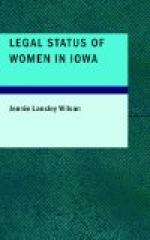A wife’s property cannot be taken for her husbands debts, although it may be in possession of the husband and the creditors have no notice of the wife’s ownership.
[Sidenote: Remedy by one against the other.]
Should either the husband or wife obtain possession or control of property belonging to the other, either before or after marriage, the owner of the property may maintain an action therefor, or for any right growing out of the same, in the same manner and extent as if they were unmarried. [Sec.3395.] If property or money belonging to the wife, but in possession of the husband is used by him, with her knowledge and consent, in the payment of debts incurred for family expenses, or for other purposes connected with the support of the family, she cannot recover for the same, in the absence of an express agreement on his part to repay her. If a wife advances money or property to her husband to be used as he may choose, the presumption is that she does so in view of the mutual benefits which may accrue from the advancement and she cannot recover the same unless there is an agreement for its repayment.
[Sidenote: Husband not liable for wife’s torts.]
For all civil injuries committed by a married woman, damages may be recovered from her alone, and her husband shall not be responsible therefor except in cases where he would be jointly responsible with her if the marriage did not exist [Sec.3396.] This statute abrogates the rule of the common law, making a husband responsible for civil injuries committed by his wife. The common law presumption that criminal acts done in the presence of the husband were by compulsion, is still recognized in this State but may be overcome by proof to the contrary.
[Sidenote: Conveyances to each other valid.]
[Sidenote: Conveyances to third parties.]
A conveyance, transfer or lien executed by either husband or wife, to or in favor of the other shall be valid to the same extent as between other persons [Sec.3397.] When the rights of creditors might be prejudiced by transfers of property between husband and wife, such transactions will be closely scrutinized, and the utmost good faith must plainly appear, but where no fraudulent intention is shown they will be upheld if based upon an adequate consideration. If a conveyance is made by the husband to the wife when the husband is largely indebted and insolvent, such conveyance is presumptively fraudulent, but a conveyance




